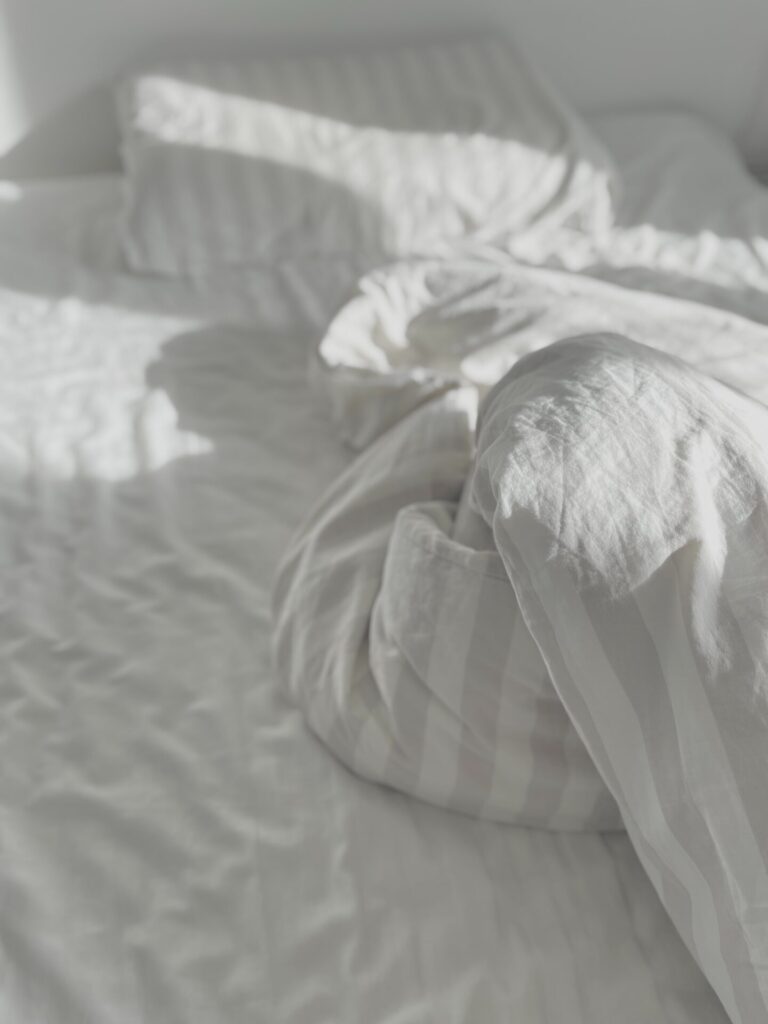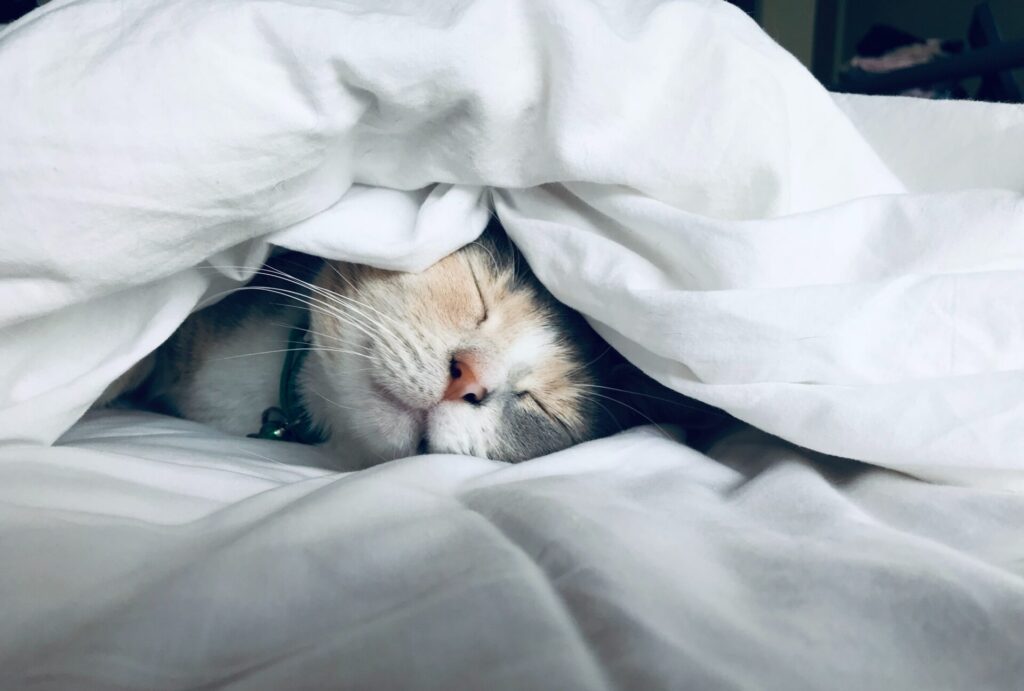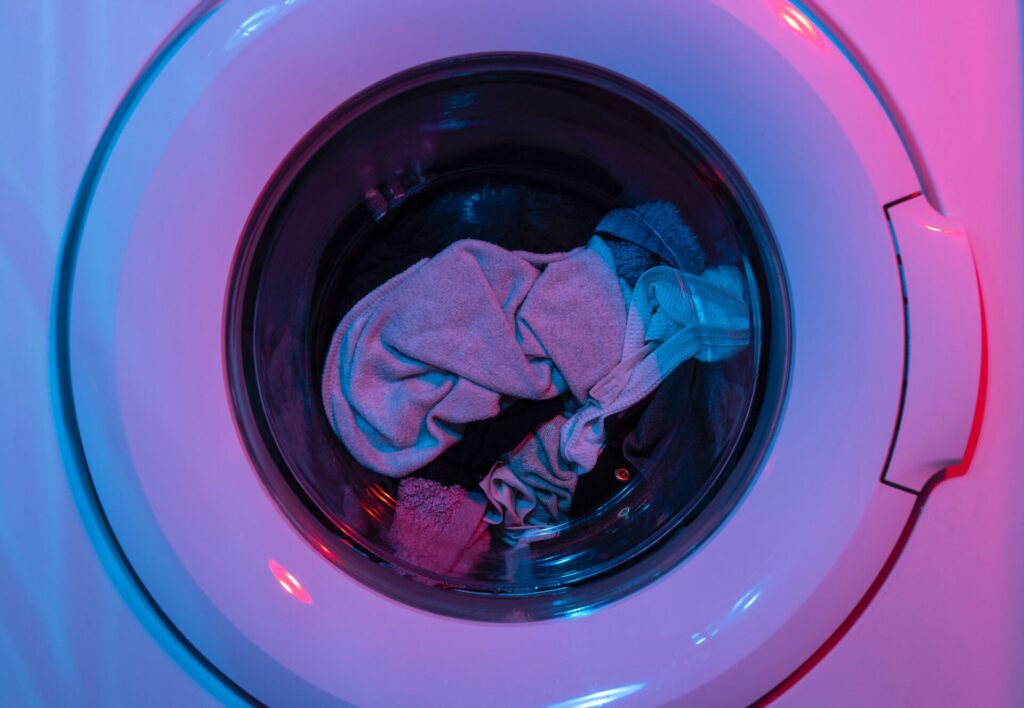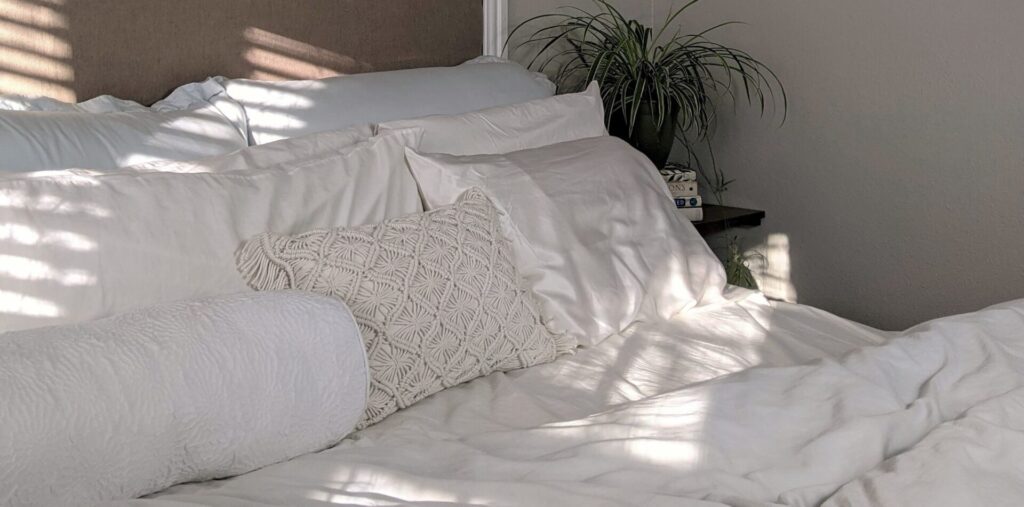We understand – After a long and busy day all you want to do is get into bed. Is there anything more satisfying than climbing into freshly washed sheets? We don’t think so. But how clean is your bed? How often are you washing your sheets? You wouldn’t wear the same clothes or underwear every day for weeks without washing them, yet some people are happy to wash bedding only once in a blue moon. Make sure you’re washing frequently enough with our guide.
After reading you will be able to:
- Comprehend why bedding needs washing so often
- Understand how often your sheets, covers, duvet and pillows needs washing
- Appreciate how often different parts of bedding need to be washed
- Know what temperature various bedding bits need to be washed at
- Effortlessly clean your bedding using our top tips
- Keep bedding fresher for longer


What Bedding Sheets Are Right For Me?
There is a whole host of bed sheet materials available on the market. The leading 7 on the market are:
- Cotton – Cotton is the most common style of bed sheet with the availability to choose from Egyptian, Pima, Upland, Flannel, and Jersey cotton. All these variants have individual feelings and attributes leading to them differing in price.
- Bamboo – An environmentally friendly material, both affordable and durable.
- Polyester – Available in pure polyester which is a slightly rougher material or a polyester blend which usually offers a softer feel. An affordable option.
- Linen – A cooling and hypoallergenic material offering a perfect solution for a hot sleeper or those who suffer from allergies.
- Silk – A pricier option that offers a soft and romantic feel. Silk is also hypoallergenic proving a good choice for those with allergies.
- Microfiber – A great option for a children’s bed as microfiber doesn’t stain. Similar to polyester with a softer feel.
- Satin – Similar to silk, satin sheets are on the pricier and more romantic side. Made from synthetic fibres.


Why Do We Need To Wash Bedding And Sheets?
It may be difficult to admit, but sometimes your bed can get a little bit, well, mucky. We spend around 1/3 of our lives sleeping, and that’s before we account for any other pastimes we spend doing in bed. Spending this much time in bed means mattresses and bedding accumulate sweat, bacteria, dead skin, dust mites, bed bugs, and for some of us, even pet hair. Not only is resting amongst these pretty nasty, but it can also prove detrimental to our health, particularly if we suffer from the likes of asthma, allergies or skin conditions.
A study from the Infection, Disease & Health association explains that infections and diseases can be passed through unwashed bedding, so bear this in mind the next time you plan on slipping in-between unwashed sheets, especially if you are unwell and share a bed with someone else.
Starting to worry about how often you should be cleaning your bedding? Fear not, we have the answers…
How Often Should You Be Washing Your Bedding Sheets?
Changing bed sheets is certainly not the most thrilling of tasks, but we would recommend washing the following at least once every fortnight:
- Duvet Covers – spending all that time draped over your body can cause duvet covers to smell after a time
- Bed Sheets – The first line of defence against the sweaty human body and the mattress, bed sheets are one of the hardest working elements in the bedding ensemble
- Pillowcases – Cradling the head all night can be greasy work
- Throws or Top Sheets – They may come into less contact with us than some of the other parts of the bedding, but that doesn’t mean they can be forgotten when it comes to wash day


Do you sleep with pets in your bed or do you consider yourself a hot sleeper? If so, it is a wise choice to wash the above more often than once a fortnight. If you can, try to avoid allowing pets to sleep in your bed with you. Our fluffy companions bring bacteria, fleas, ticks, and other nasty things into your sheets that make them an unhygienic place to sleep. You can even pick up illnesses and infections from sharing your sleepy haven with your pets.
What Temperature Should You Be Washing Your Bedding Sheets At?
Bacteria thrive and grow in what is called the ‘Danger Zone’ a temperature anywhere between 8°C and 60°C. You should wash bedding and sheets above 60°C to kill all of the germs residing within your sheets. Use a fabric softener when washing to keep your sheets nice and soft to create a comfortable sleeping environment.

How Often Do You Need To Be Washing Your Pillows?
However infrequently, most of us do wash our bedding often, which includes pillow cases. But it can be easy to overlook washing the actual pillows. Our pillows can host an unfortunate mix of bugs, dead skin, and dust mites meaning washing pillows is as important as washing the rest of the bedding. Aim to wash your pillows at least once every three months to keep any germs at bay. As you should with bedsheets, be sure to wash pillows at a temperature of over 60°C to kill off any bacteria.

Unfortunately, not all pillows are suitable for being washed in a washing machine. Therefore, it is important to check the label of your pillow for the cleaning instructions. Traditional Feather & Down pillows can be cleaned in a washing machine without the fillings being damaged providing they are washed in a gentle, warm cycle. Latex, foam, and certain other pillows cannot be machine washed as the cycle will damage the fillings, if you own one of these types of pillows check the manufacturer’s guidelines on how to safely clean.
Too late to save your pillow? After burning it then read our guide to choosing a pillow to help you decide on which of our luxurious plump offerings are best for you.
How Often Do You Need To Be Washing Your Duvet?
Duvets don’t need to be washed as often as your sheets and pillows as they are not directly slept on. We recommend washing your duvet at least once every 6 months. As with pillows and bedding, you should check the manufacturer’s care manual to ensure the duvet is washable. Traditional duvets are usually suitable to put on a 60°C cycle, however, they may need to be washed at a higher or lower temperature depending on what duvet you have. For instance, certain duvets may need to be dry cleaned to keep them in a good enough condition.
Is it time for a new duvet? Read our guide on choosing the best duvet to find the right one for you.

Top Tips To Keep Your Bedding Fresher For Longer
Below is a list of top tips to help you keep your bedding and sheets fresher for longer!
- Don’t Overcrowd The Washing Machine – Allow enough space for the bedding to properly clean
- Wash Your Bedding & Sheets Separate From Other Items – Be sure to wash your bedding separate from clothing and other washable items
- Iron Your Sheets & Pillowcases – This will not only make your bed look neater but will kill off any lasting bacteria
- Take A Shower Or Bath Before Bedtime – Taking a hot bath or shower before bed will clean off any dirt and germs you have picked up during the day leaving you cleaner to get into bed.

In conclusion, regular washing your bedding is important for hygiene and a peaceful night’s sleep. We hope that this article has proved helpful in understanding the importance of washing your bedding, and the many reasons why. Do you have any questions or feel it is time for a new mattress, pillow, or bedding? If so, don’t hesitate to get in touch with our team of bed experts. Our specialists can provide you with all of the assistance and advice that you need.
Oh, and don’t forget to show some TLC to your mattress too, which needs flipping and rotating on a regular basis.
Would you like to read more about beds and bedding? The following articles might be of use:
What to do with a Mattress That’s Too Soft
How To Create A More Relaxing Bedroom
The Best Pillows For Back Pain
Need Help With Your Sleep?
Think your bed is beyond cleaning? We’re here to help you find a new one.
Great sleep hygiene is essential to a healthy lifestyle. We might not be able to eliminate all the reasons why a bed gets dirty in the first place, but we can certainly provide you with a new mattress to start afresh.
Now that you know how to take better care of your bedding, let us take care of your comfort.
Deciding on the best bed for your needs depends on several factors.
- What type of sleeper are you?
- Do you have a temperature you sleep best in?
- What materials are you most comfortable on?
There is no need to lose sleep over trying to choose the ideal bed and bedding for your night-time needs. Our bed experts at Land of Beds pride themselves on their specialist knowledge and ability to help you find the bed and bedding that’s best for you.
Our customer-first policy means we listen and give good, independent advice based on the needs of the individual. By pairing consumers up with ethically sourced, affordable, quality products, we provide as many people as possible with a great night’s sleep.
Need to be connected with an inviting bed that will help you unwind? Get in touch with us on 01928 242829

